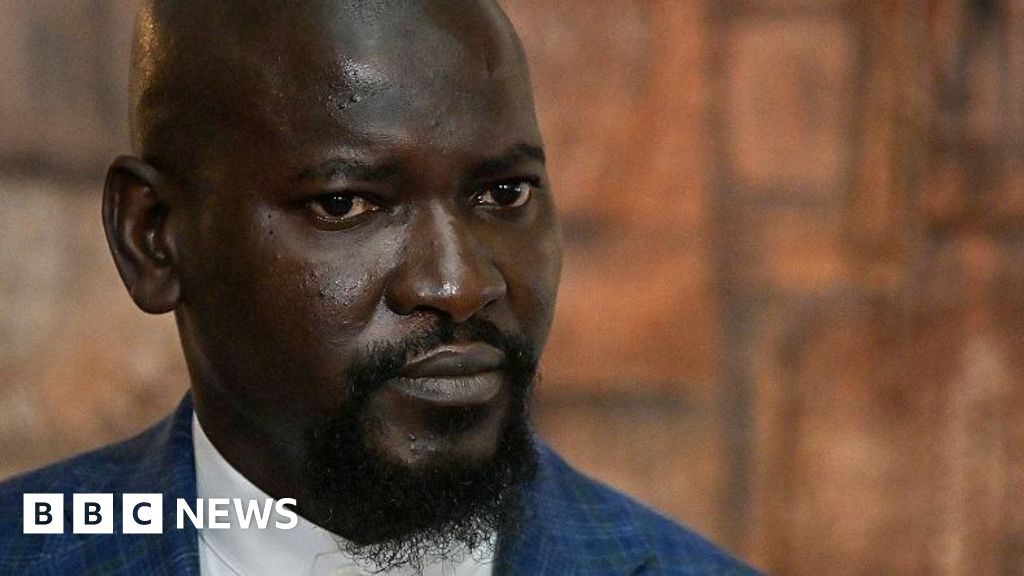Guinea's coup leader enters presidential race

Guinea's Junta Leader Enters Presidential Race, Raising Credibility Concerns
Guinea's military leader, General Mamady Doumbouya, who seized power in a 2021 coup, has officially entered the presidential race scheduled for next month. This move breaks his earlier pledge to transition power to a civilian government, sparking concerns about the legitimacy of the upcoming elections.
Gen. Doumbouya submitted his candidacy at the Supreme Court on Monday, accompanied by soldiers. He refrained from making any public statement. His decision comes amidst controversy surrounding the exclusion of two major opposition parties, RPG Arc en Ciel and UFDG, from participating in the December contest.
Opposition Disqualified, High Fees Spark Outcry
The exclusion of prominent opposition parties coupled with a hefty candidate deposit fee of 875 million Guinean francs (approximately $100,000; £75,000) has fueled criticism and raised questions about fairness and inclusivity. While the previous deposit was comparably high, some analysts had hoped for a reduction to encourage broader participation in what are considered pivotal elections for the nation's future.
Ibrahima Diallo, a political analyst based in Conakry, commented, "The high deposit fee and the exclusion of key opposition figures effectively create an uneven playing field. This undermines the democratic process and risks further destabilizing the country."
Broken Promises and a New Constitution
Gen. Doumbouya's decision to run directly contradicts his previous commitment made after the coup to refrain from seeking office. "Neither I nor any member of this transition will be a candidate for anything... As soldiers, we value our word very much," he stated in 2021.
The elections are being conducted under a new constitution, approved in a referendum widely criticized for lacking transparency, which now allows Gen. Doumbouya to contest the presidency. Critics argue that this constitution was specifically designed to legitimize his continued rule.
Crackdown on Dissent and Media Restrictions
Since assuming power, Gen. Doumbouya's regime has faced accusations of suppressing dissent, restricting freedom of expression, and curtailing media freedoms. Several media outlets have been suspended, internet access has been intermittently restricted, and demonstrations calling for a return to civilian rule have been met with forceful suppression.
Human Rights Watch, in a recent report, highlighted "a worrying trend of increasing restrictions on civic space and fundamental freedoms in Guinea under the junta's rule." The report cited instances of arbitrary arrests, intimidation of journalists, and the use of excessive force against peaceful protesters.
Justification for the Coup and Background of the Leader
Gen. Doumbouya justified the 2021 coup by citing similar grievances against then-President Alpha Condé, including allegations of widespread corruption, human rights abuses, and economic mismanagement. Condé had altered the constitution to allow himself to run for a third term, sparking widespread protests and ultimately leading to the military intervention.
Prior to seizing power, Gen. Doumbouya was a relatively unknown middle-ranking officer. His military career spanned 15 years, including deployments to Afghanistan, Ivory Coast, Djibouti, Central African Republic, and security assignments in Israel, Cyprus, the UK, and Guinea. At 40 years old, he is currently one of the youngest heads of state in Africa.
Key Figures Absent from the Political Landscape
The upcoming election will occur without the participation of several prominent political figures. Former President Alpha Condé, ousted in the 2021 coup, and former Prime Ministers Cellou Dalein Diallo and Sidya Touré, are all currently living in exile. Their absence further complicates the political landscape and raises concerns about the inclusiveness of the process.
Historical Context and Regional Implications
Guinea's political instability is not isolated. The country has a history of coups and political upheaval since gaining independence from France in 1958. The recent wave of military takeovers in West Africa, including in Mali, Burkina Faso, and Niger, underscores a broader trend of democratic backsliding in the region. Analysts suggest that factors such as weak governance, corruption, and socio-economic grievances contribute to the rise of military interventions.
Dr. Aminata Traoré, a researcher specializing in West African politics, notes, "The situation in Guinea reflects a wider crisis of governance and legitimacy in the region. The international community needs to adopt a more nuanced approach, focusing on supporting genuine democratic reforms and addressing the root causes of instability rather than simply condemning military interventions."
Originally sourced from: BBC News Africa
